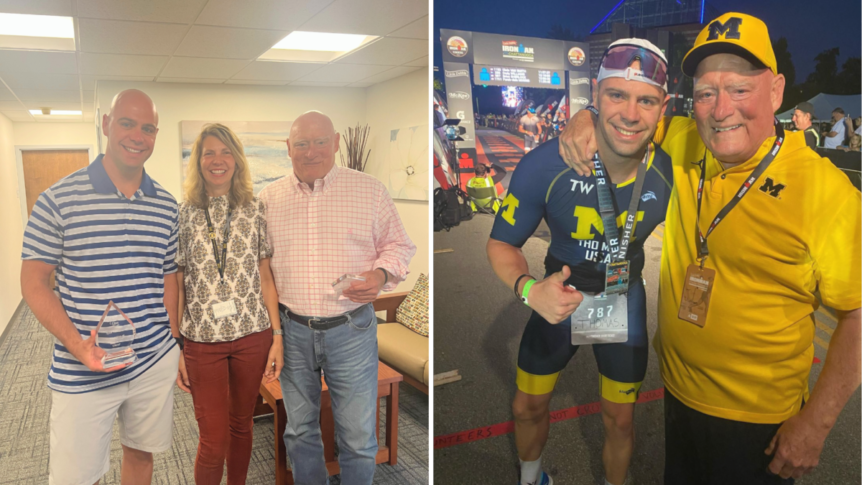The University of Michigan Aphasia Program (UMAP) is excited to announce the creation of the Tim Wadhams & Tyler Thomas Aphasia Awareness Fund.
The fund was originally conceived in 2021 by Tyler Thomas in honor of Tim Wadhams, a close family friend and mentor to Tyler.
In 2020, Tim had a stroke and was subsequently diagnosed with aphasia. Tim was in the hospital for a month. Laurie, Tim’s wife, said his language usage was severely limited in those early days.
Tim then attended the University of Michigan Aphasia Program and made substantial gains in his communication skills.
Tyler, recognizing the impact aphasia has had on Tim’s life and what awareness of the condition could do for others, decided to focus on raising awareness and money to help provide access to aphasia treatment.
“When I started reading up and learning about aphasia, it opened up a whole different side of it that not a lot of people actually know,” Tyler said. “The ability to communicate and to tell people how you feel and what you’re doing — I think we take it for granted.’
Tyler’s initial goal was to raise $10,000 via a GoFundMe for UMAP to help with the financial assistance program. Although he reached his goal he didn’t stop there.
Tim said UMAP has helped him progress and that he would encourage others with aphasia to be as engaged as possible right away in their recovery. He recognized that not everyone has access to aphasia resources, which makes Tyler’s efforts that much more essential.
So together, Tim joined forces with Tyler, and the Tim Wadham and Tyler Thomas Aphasia Fund was created in 2023. The goal of this endowment is to provide funds to help those with aphasia attend UMAP, who otherwise would not have the financial means to do so. This provides much-needed treatment opportunities to a wider range of aphasia clients.
We believe everyone who has aphasia should have access to the best treatment options, regardless of their financial circumstances or location. UMAP is grateful and appreciative of the incredible generosity of Tim and Tyler, and their desire to help others with aphasia.
If you are interested in donating to this fund, visit the online donation page. Donate to Tim and Tyler’s fund here.
Why is this important?
Most insurances do not support speech-language therapy for aphasia beyond 2-3 hours a week for a short time after a person develops aphasia and returns home after a hospitalization.
In Aphasia in North America [white paper], published by Aphasia Access in 2018, “The most significant gap associated with services for people with aphasia is the lack of funding to support rehabilitation and long-term care needs,” including intensive aphasia speech-language therapy.
“Most health care funding is [only] available during the first weeks or months after the onset of aphasia. Funding for ongoing support during chronic stages of aphasia is extremely limited,” (Aphasia in North America, 2018).
However, research shows that with intensive, individualized speech-language therapy, many people with aphasia make measurable gains, regardless of how long it has been since they acquired the communication disorder.
Providing a way for people to access intensive therapy programs is key for anyone who experiences aphasia.
About the U-M Aphasia Program and UCLL
The U-M Aphasia Program (UMAP) provides intensive, comprehensive speech-language therapy for people with aphasia, caused by a stroke, brain injury, illness, or other neurological disorder. UMAP is part of the University Center for Language and Literacy (UCLL), which is committed to helping people of all ages find meaningful ways to communicate. UCLL is part of the Mary A. Rackham Institute (MARI) at the University of Michigan.

